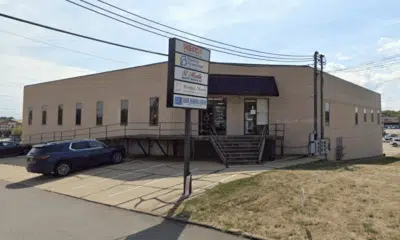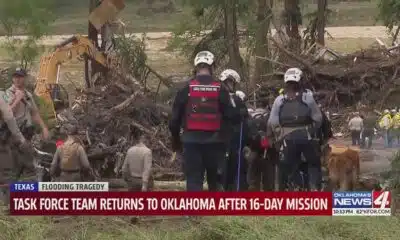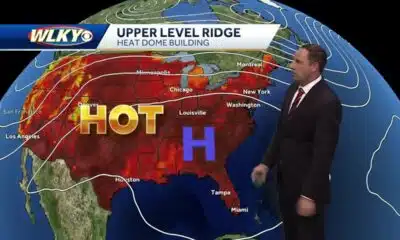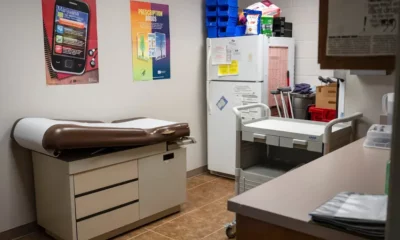News from the South - North Carolina News Feed
Healthy food access limited after Helene in Western NC.
Hunger and a lack of access to healthy food continues to plague parts of Western North Carolina, eight months since Tropical Storm Helene tore through the mountains.
The storm ripped apart bridges, roads and farmland. Even now, some cannot easily access grocery stores — the ones that are open, that is.
And without farms running at full capacity, less healthy local food is available to stock the shelves.
The cost of rebuilding, coupled with heightened unemployment, has left some in a state of economic precarity. In a time when the price of groceries is high, folks have to make difficult decisions about what kind of food to buy and when.
[Subscribe for FREE to Carolina Public Press’ alerts and weekend roundup newsletters]
In Spruce Pine, the town’s lone grocery store, Ingles, still has not reopened, going past a promised deadline the company made publicly to reopen the location by May.
“The stigma around coming to us is gone,” Starli McDowell, who runs a food bank in Spruce Pine, told Carolina Public Press.
“Everybody comes.”
Even before the storm, rates of food insecurity were higher in Western North Carolina than in other parts of the state.
In 2021, about 20% of adults in the mountains reported having limited access to food, according to WNC Health Network. Statewide, NCDHHS put the number at 11%.
Healthy food and the lost province
The situation has only grown more dire since the storm.
“Up here, we are called the lost province,” said Maura McClain, of the Hunger and Health Coalition in Watauga County. “We’re isolated because of geography. For generations, we have seen this need from working-class individuals who are just not able to make ends meet.
“That’s been amplified by growth. It’s an expensive place to live. We’re seeing locals who have been here for generations who are not able to afford it anymore. That was before (Helene). Now, we’re seeing that even more.
“Those who are just on the cusp of surviving up here, they have been pushed over the edge. People who were a paycheck away, they’ve now tipped over that scale. Any money they make is going toward recovering from the flood, repairing their homes. There’s no money for food or medicine or anything else.”
Critical programs like food stamps are being threatened in Washington. Cuts to that program, currently up for debate between the House and Senate, would affect North Carolinians trying to get food on the table, as well as farms and food retailers across the state.
On the heels of Helene, Western North Carolina is at particular risk of having its food networks collapse.
Key state and federal dollars for major organizations in Western NC like MANNA Foodbank — which fed nearly 200,000 people in April alone — are already starting to disappear.
Trouble at MANNA and SNAP
Starting in September, MANNA Foodbank will lose $1.3 million from the US Department of Agriculture, gutting a program that allows them to buy produce from local farmers.
“That money allows farmers to get back on their feet,” said Micah Chrisman, spokesperson for MANNA. “It allows our neighbors in need to walk away with more than canned goods. We want to provide healthy, fresh produce, cheese and eggs in addition to rice and beans.”
What’s more, the proposed state budget does not provide any funding for the Healthy Opportunities Pilot, a state program dedicated to food, housing and transportation initiatives. The program is slated to end July 1.
MANNA was a partner organization in that program, which generated $1 million in revenue for Western NC farmers and provided boxes of healthy food for vulnerable people.
“This isn’t the time to be cutting access to healthy food and economic opportunities in a community that was so devastatingly hit by a natural disaster,” Chrisman said.
But even more dramatic cuts could be coming — in the form of $300 billion from food stamps.
New work reporting requirements for households with young children proposed in Congress could result in hundreds of thousands of North Carolinians losing their food assistance dollars.
“I’ve done this work for 36 years,” said Phillip Hardin, economic services director for Buncombe County, home to Asheville.
“I can’t say that I ever really remember it coming down to something like this.”
The rate of SNAP enrollment exceeds 10% of residents in many Western North Carolina counties. In some, such as Rutherford County, it nears 20%.
Some in Congress hope to pass the costs of the program off onto the state. There are few who believe the state has the resources to make meaningful contributions.
“When federal support is reduced, states may be forced to absorb more of the costs associated with food insecurity,” said Susan Epley, who works with the Rutherford County Department of Social Services.
“In turn, these costs often trickle down to counties — many of which, like ours, don’t have the funding to fully meet the increased demand.”
Farming anxiety
Cuts to SNAP have the potential to impact not just families, but the wider economy in the mountains.
By providing residents with dollars to spend on food, the SNAP program puts those dollars into the pockets of local retailers, and in turn, farmers.
Those farms need all the help they can get.
Farms tend to be located in the region’s fertile river bottoms, and when those rivers swelled and roared, they took crops, barns, bales of hay, miles of fencing, farm roads, cattle, farm equipment and acres of topsoil.
About 90% of Western North Carolina’s farms suffered severe damage, according to the Appalachian Sustainable Agriculture Project, or ASAP.
Now, with money from MANNA and SNAP on its way out, anxiety is higher than ever in the Western North Carolina farming community.
“Right now, it feels almost impossible for me to continue pursuing a career in farming,” one farmer told ASAP. “It’s breaking my heart.”
Still, some farmers are still able to contribute to local markets and get food onto tables.
When a new county-run market opened in April to serve the hard-hit Swannanoa area, the entire food supply was exhausted in 30 minutes, according to Leonard Jones, who runs the Buncombe County community markets. Normally, such markets operate for two hours.
Meanwhile, with so many roads still closed, families are still hiking back to their homes with grocery bags.
This article first appeared on Carolina Public Press and is republished here under a Creative Commons Attribution-NoDerivatives 4.0 International License.
The post Healthy food access limited after Helene in Western NC. appeared first on carolinapublicpress.org
Note: The following A.I. based commentary is not part of the original article, reproduced above, but is offered in the hopes that it will promote greater media literacy and critical thinking, by making any potential bias more visible to the reader –Staff Editor.
Political Bias Rating: Center-Left
This article highlights economic hardship, food insecurity, and the impact of government program cuts in Western North Carolina, with a focus on vulnerable populations and support programs like SNAP and food banks. The framing emphasizes the negative consequences of reduced federal funding and policy decisions, which aligns with concerns typically raised by center-left perspectives advocating for social safety nets and public assistance. However, the article reports facts and includes quotes from various stakeholders without overt partisan language or editorializing, maintaining a largely factual tone while reflecting concerns more common to center-left viewpoints.
News from the South - North Carolina News Feed
Frustration mounts over schools funding freeze
SUMMARY: The Wake County School District faces a potential $8.1 million loss due to a federal funding freeze impacting after-school and summer programs. Tracy Pittman, director of Wilson Youth United, struggles to keep operations running without confirmed grant money for the upcoming year, despite the Trump administration unfreezing over $1 billion nationally. The nonprofit’s 30,000-square-foot center serves 175 children, offering safe after-school care while parents work. Federal officials claim funds are withheld because some programs misuse money promoting a “radical left wing agenda.” North Carolina lawmakers warned Education Secretary Linda McMahon about the severe impact on Wake County schools.
Families are caught in the middle as the federal government continues to withhold education funding.
https://abc11.com/post/school-funding-parents-camp-directors-make-plea-federal-education/17261596/
Download: https://abc11.com/apps/
Like us on Facebook: https://www.facebook.com/ABC11/
Instagram: https://www.instagram.com/abc11_wtvd/
Threads: https://www.threads.net/@abc11_wtvd
TIKTOK: https://www.tiktok.com/@abc11_eyewitnessnews
News from the South - North Carolina News Feed
Church finds the urgency when car crashes through new doors
SUMMARY: A stolen car crashed through the front doors of Berean Baptist Church in Fagatville, causing extensive damage to the newly installed $8,000 doors and the storefront, with repair costs estimated around $25,000. Police say 18-year-old Demir Denning, driving a stolen vehicle with a masked passenger, sped off and crashed before being arrested. The church’s executive pastor described watching the surveillance video as overwhelming but remains grounded in faith, seeing purpose in the incident. Thankfully, no one was seriously injured. The church continues worship services as scheduled while repairing the damage.
A stolen car plowed into a Fayetteville church early Tuesday, leaving behind almost $25,000 in damage, the pastor said.
News from the South - North Carolina News Feed
Magic of Storytelling | Scamp the Hero
SUMMARY: Scamp, a curious and adventurous puppy, leaves home to explore the world beyond his yard. He encounters a frightened poodle named Princess being bullied by big dogs. Using cleverness, Scamp scares them away but causes a mess. The two puppies find a giant bone, which turns out to be a stolen dinosaur bone from a museum. Scamp bravely helps the police dog solve the robbery. After a long search, Scamp’s parents find him at the museum, where he’s celebrated as a hero. The museum honors Scamp and Princess with a feast and treats for their bravery.
Scamp and his new friend Princess are off on a mischievous adventure, but when Lady and The Tramp finally find there pup he’s being rewarded as a hero for finding a special artifact from the museum!
Learn more about your ad choices. Visit podcastchoices.com/adchoices (https://podcastchoices.com/adchoices)
-
Mississippi Today7 days ago
Driver’s license office moves to downtown Jackson
-
News from the South - Georgia News Feed7 days ago
Aiken County family fleeing to Mexico due to Trump immigration policies
-
News from the South - North Carolina News Feed3 days ago
Helene devastated our region. Even more death and despair might be on the way. • Asheville Watchdog
-
News from the South - Tennessee News Feed7 days ago
A heart implant could make Tennessee’s next execution painful and prolonged. Prison officials argue they don’t have to disable the device.
-
Mississippi Today7 days ago
Whooping cough cases increase in Mississippi
-
News from the South - Texas News Feed7 days ago
Texas advocacy group on ICE accessing Medicaid data
-
News from the South - Texas News Feed6 days ago
1.7 million Texans could lose health care under ACA changes
-
News from the South - Florida News Feed7 days ago
Sen. Collins talks DeSantis loyalty, Fla. Lieutenant Governor spot










































